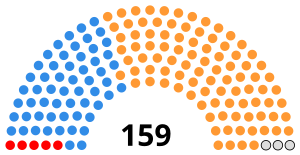South African general election, 1953
|
|
|||||||||||||||||||||||||||||||
|---|---|---|---|---|---|---|---|---|---|---|---|---|---|---|---|---|---|---|---|---|---|---|---|---|---|---|---|---|---|---|---|
|
|||||||||||||||||||||||||||||||
|
All 156 general roll seats in the House of Assembly |
|||||||||||||||||||||||||||||||
|
|||||||||||||||||||||||||||||||

House of Assembly after the election
|
|||||||||||||||||||||||||||||||
|
|||||||||||||||||||||||||||||||
The 1953 South African general election, held on 15 April of that year, consolidated the position of the National Party under DF Malan, who won an absolute majority of the 156 seats in the House of Assembly. The United Party under JGN Strauss lost several seats, and suffered several splits after the election.
The second term of the white MPs elected to represent black voters, from special electoral districts in Cape Province under the Representation of Natives Act 1936, expired on 30 June 1948 (just over a month after the National Party came to power in the 1948 general election). These seats were not vacated by a dissolution of Parliament, so they were not contested at either the 1948 or 1953 general elections.
The three representative seats were filled by elections on 17 November 1948. Two Independent MPs (W.H. Stuart of Transkeian Territories and Mrs V.M.L. Ballinger of Cape Eastern) were returned. The third seat was taken by Sam Kahn, a South African Communist Party member, who gained the seat from an Independent.
The term of these members expired on 30 June 1954 (the first 30 June to fall after five years from the date of election).
The Communist Party dissolved itself (at least as an open political party) when legislation to ban it was going through Parliament in 1950. Sam Kahn was ultimately banned from being a member of Parliament, in 1952, under the anti Communist legislation. Subsequently two successive by-elections were held in Cape Western, but the victors had similar views to Mr Kahn and were also excluded from Parliament. The seat was then left vacant for the remainder of the term.
The white electors of the territory of South-West Africa (present day Namibia), were allocated six seats in the House of Assembly. These new electoral divisions were first filled at by-elections on 31 August 1950. The governing National Party won all the seats, which were additional to the 150 general roll seats allocated to the Union of South Africa.
...
Wikipedia


